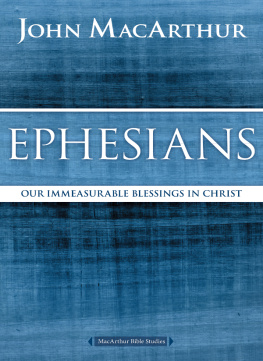The God Who Loves

THE LOVE OF GOD by John MacArthur, Jr. Copyright 1996, 2001 by John MacArthur, Jr. Published by W Publishing Group, a Thomas Nelson company, P.O. Box 141000, Nashville, Tennessee, 37214. All rights reserved. No portion of this book may be reproduced in any form or by any meanselectronic, mechanical, photocopy, recording, or any otherexcept for brief quotations in printed reviews, without the prior permission of the publisher.
All Scripture quotations in this book, except those noted otherwise, are from The New American Standard Bible, 1960, 1962, 1963, 1968, 1971, 1973, 1975, and 1977 by The Lockman Foundation, and are used by permission.
Quotations marked NIV are from The Holy Bible: New International Version. Copyright 1973, 1978, 1984 by the International Bible Society. All rights reserved. Used by permission of Zondervan Bible Publishers.
Quotations marked KJV are from The King James Version of the Bible.
ISBN 978-1-4002-7794-0
04 05 06 07 9 8 7 6
Printed in the United States of America
To Patricia,
whom 1 love more than life itself
and whose love for me
is closer to heavenly perfection
than anything I have known on earth
Contents
by Thomas Chalmers
by Andrew Fuller
by Thomas Boston
by John Brown
A FEW YEARS AGO I had the opportunity to spend several days traveling with Bill and Gloria Gaither, the well-known gospel musicians. At one point I asked Bill what, in his estimation, were the greatest Christian lyrics ever writtenaside from the inspired Psalms.
Without hesitation, he began quoting the words from F. M. Lehman's "The Love of God:"
The love OF God is greater far
Than tongue or pen can ever tell;
It goes beyond the highest star,
And reaches to the lowest hell
The guilty pair, bowed down with care,
God gave His Son to win;
His erring child He reconciled,
And pardoned from his sin.
When hoary time shall pass away,
And earthly thrones and kingdoms fall,
When men who here refuse to pray,
On rocks and hills and mountains call,
God's love so sure, shall still endure,
All measureless and strong;
Redeeming grace to Adam's race
The saints' and angels' song.
Could we with ink the ocean fill,
And were the skies of parchment made,
Were every stalk on earth a quill,
And every man a scribe by trade,
To write the love of God above
Would drain the ocean dry.
Nor could the scroll contain the whole,
Though stretched from sky to sky
0 love of God, how rich and pure!
How measureless and strong!
It shall forevermore endure
The saints' and angels' song.
No lyrics in all hymnody surpass the third stanza of that song, he said.
Indeed, few rivals come to mind. The poetry alone is beautiful but the meaning is profound.
As I pondered that song, my mind was flooded with echoes from Scripture. "God is love," the apostle John wrote (1 Jn. 4:8,16). "His lovingkindness is everlasting" is the refrain for all twenty-six verses of Psalm 136. Those same words appear at least forty-one times in the Old Testament. God's lovingkindness is better than life itself, the psalmist reminds us (Ps. 63:3). God is "merciful and gracious, slow to anger and abundant in lovingkindness and truth (Ps. 86:15)." He "is good; His lovingkindness is everlasting" (Ps. 100:5).
Elsewhere the psalmist writes, "How precious is Thy lovingkindness, O God! And the children of men take refuge in the shadow of Thy wings" (Ps. 36:7). And "I will sing of the lovingkindess of the Lord forever.... Lovingkindness will be built up forever" (Ps. 89:1-2).
The New Testament unveils the ultimate proof of God's love: "But God demonstrates His own love toward us, in that while we were yet sinners, Christ died for us" (Rom. 5:8). "By this the love of God was manifested in us, that God has sent His only begotten Son into the world so that we might live through Him. In this is love, not that we loved God, but that He loved us and sent His Son to be the propitiation for our sins" (1 Jn. 4:9-10). "God, being rich in mercy, because of His great love with which He loved us... made us alive together with Christ (by grace you have been saved), and raised us up with Him, and seated us with Him in the heavenly places, in Christ Jesus" (Eph. 2:4-6).
And the most familiar verse of all says this: "For God so loved the world, that He gave His only begotten Son, that whoever believes in Him should not perish, but have eternal life" (jn. 3:16).
No wonder the apostle exults, "See how great a love the Father has bestowed upon us...." (1 Jn. 3:1).
Obviously, God's love and goodness are persistent themes in both the Old and New Testaments. If the amount of space the Bible gives the subject is any indication, hardly any truth about God is as important as His love. On almost every page of Scripture we see divine goodness, tender mercies, lovingkindness, patience, longsuffering, and grace. All those virtues are expressions of God's love.
The doctrine of God's love is by no means simple. It raises a host of philosophical and theological difficulties. For example, some of the most obvious questions it brings up are these: If God is so loving, why does He send people to hell? Why does He allow sin and suffering and pain and sorrow? How can holocausts and natural disasters and other forms of mass destruction and human suffering exist in a universe designed by a God who is truly loving? Why did God allow the human race to be plunged into sin in the first place?
In all honesty we need to acknowledge the difficulty of questions like those. All of us have asked them. Many of us have been challenged with such questions from skeptics who ask us to provide satisfactory answers. If we're honest, we must admit that the answers are not easy God Himself has not seen fit to reveal full answers to some of those questions. Instead, He reveals Himself as loving, all-wise, perfectly righteous, and supremely goodand He simply bids us trust Him.
That becomes easier the better we understand what Scripture teaches about the love of God. In this book we will grapple with some of those difficult questions about God's love, but not until we've laid a good foundation for understanding what Scripture means when it says, "God is love."
We must also note that several of the very worst corruptions of Christian truth are based on the notion that God can be understood solely in terms of His love. Those who hold such a perspective often refuse to acknowledge God's wrath against sin, because they believe He cannot be both loving and angry with sinners. Others, perhaps intending to dissociate God from the tragedies and terrors of human experience, reason that if God is truly loving, He can't possibly be all-powerful; otherwise, He would put a stop to all suffering.
On the other hand, some well-meaning Christians concerned with doctrinal orthodoxy are so cautious about overemphasizing God's love that they fear to speak of it at all. Our culture, after all, is "in love" with sin and self-love, and utterly dull to the wrath of God against sin. Isn't it counterproductive to preach the love of God in the midst of such an ungodly society? Some who reason thus tend to see every bad thing that happens as if it were a direct judgment from the hand of a severe Deity.
Both extremes paint a distorted picture of God and further confuse the issue of understanding God's love.
As long as we stay within the bounds of biblical truth about God's love, we can avoid both of these transgressions. As we examine what the Bible says about this subject, we will see how wonderfully God's love can be presented to sinners and how perfectly it fits with His hatred of sin. And the things hard to understand are made easier.
Next page

















